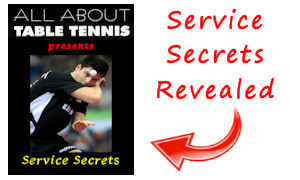You Are Here: Home » Rules of Table Tennis » A Good Return
Basic Table Tennis Rules Explained
A Good Return
One of the basic table tennis rules is about making a good return.
But what does that mean? Find out here...
By Martin Hughes
Owner and Editor
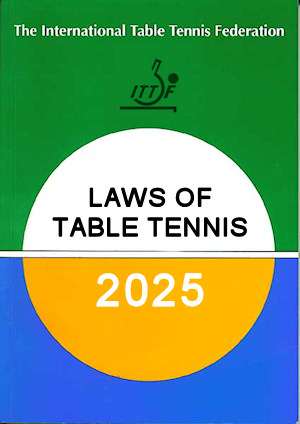
The official rules of table tennis are a comprehensive set of rules and regulations which cover a multitude of situations which may arise during a game.
But let's just take a look at a few of the basic table tennis rules which deal with making a good return.
We'll look at what constitutes a good return and answer questions such as whether you can you use your hand to play a shot.
We'll also look at what happens if you move the table, touch the playing surface or touch the net.
Need your questions about the Rules and Regulations answered SIMPLY and CLEARLY?
Take a look at this fully up-to-date downloadable book. You'll find everything you need.
Get all the details here...
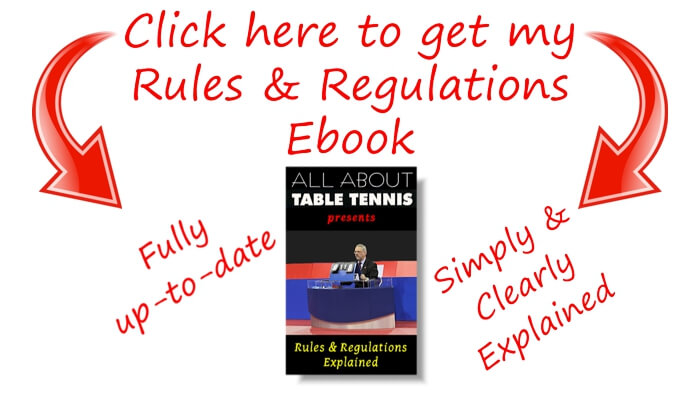
TABLE TENNIS EXPERT
REVEALS HIS SECRETS
Click Here For Details

Click here for a large selection of
table tennis equipment at Megaspin *
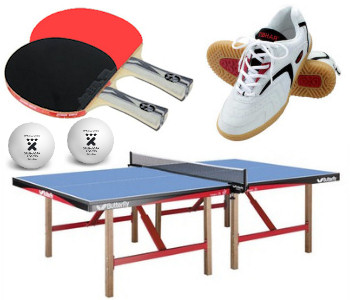
Click here for a large selection of
table tennis equipment at Bribar *
OK, let's start with ...
Striking the ball - what is a good return?
Rule 2.05.07 states that ...
A player strikes the ball if he or she touches it in play with his or her racket, held in the hand, or with his or her racket hand below the wrist.
You can read more about the racket (also known as a paddle or bat) here.
This means that all of the following are legal and will constitute a good return.
You can hit the ball with ...
- the rubber on your table tennis racket, or
- the edge of your table tennis racket, or
- the handle of your table tennis racket, or
- any part of your racket hand below the wrist, including the fingers of your racket hand
TABLE TENNIS EXPERT
REVEALS HIS SECRETS
Click Here For Details

Click here for a large selection of
table tennis equipment at Megaspin *

Click here for a large selection of
table tennis equipment at Bribar *
However ... your hand is only your racket hand if it's holding your table tennis racket. This means that you can't drop your racket and then hit the ball with your hand ... because your hand is no longer your racket hand.
Additionally, you can't make a good return by throwing your table tennis racket at the ball. You must be holding your racket when it hits the ball for it to be a good return.
Of course, you could transfer your table tennis racket from one hand to the other hand because your other hand would then become your racket hand ... but that's quite difficult to do!
However, Andrzej Grubba of Poland was particularly good at that. Here's a short video clip which shows him transferring his table tennis racket from his right hand to his left hand during a rally.
You can see that although he was right-handed, he was pretty good at playing left-handed too...
And Timo Boll, who is left-handed, frequently uses his right hand too...
^ Top of page ^
But what do the basic table tennis rules say if you...
Move the table
Rule 2.10 states...
Unless the rally is a let, a player shall score a point if an opponent, or anything an opponent wears or carries, moves the playing surface.
This means that if you cause the table tennis table to move whilst the ball is still in play, you lose the point.
This usually happens when you rush forward to play a shot. After you've played your shot, your forward momentum can cause you to move the table.
However, if the ball wasn't in play when you moved the table tennis table, there's no penalty. For example, once the ball has bounced a second time (either on the table, floor, surroundings, or hits your opponent), the ball's no longer in play.
Here's an example of World number one, Ma Long (red shirt), moving the table during a rally.
You can see that Ma Long serves, then Simon Gauzy (blue shirt) returns the ball.
As Ma Long steps forward to play his next stroke he accidently moves the table.
However, Simon Gauzy obviously didn't notice that Ma Long had moved the table and continued to play ... ending with a fabulous backhand smash.
But the outcome was already decided as soon as the table was moved by his opponent ... and the point was awarded to Simon Gauzy.
Any strokes played after the table was moved were irrelevant.
The umpire then re-measured the height of the net to make sure that it hadn't changed when the table was moved.
NB. There is no sound on this video.
^ Top of page ^
And what do the basic table tennis rules say about...
Touching the playing surface
Rule 2.10 also states that...
Unless the rally is a let, a player shall score a point if an opponent's free hand touches the playing surface.
This means that if you touch the playing surface (i.e. the top of the table tennis table) with your hand which is not holding your racket whilst the ball is still in play, you lose the point.
So, if you're right handed and have your racket in your right hand, and you touch the playing surface with your left hand, you lose the point.
However, as long as you do not move the table, you can touch the table with your racket or any other part of your body without penalty.
Need your questions about the Rules and Regulations answered SIMPLY and CLEARLY?
Take a look at this fully up-to-date downloadable book. You'll find everything you need.
Get all the details here...
^ Top of page ^
But you're allowed to touch the table between rallies...
Touching the table when the ball is not in play
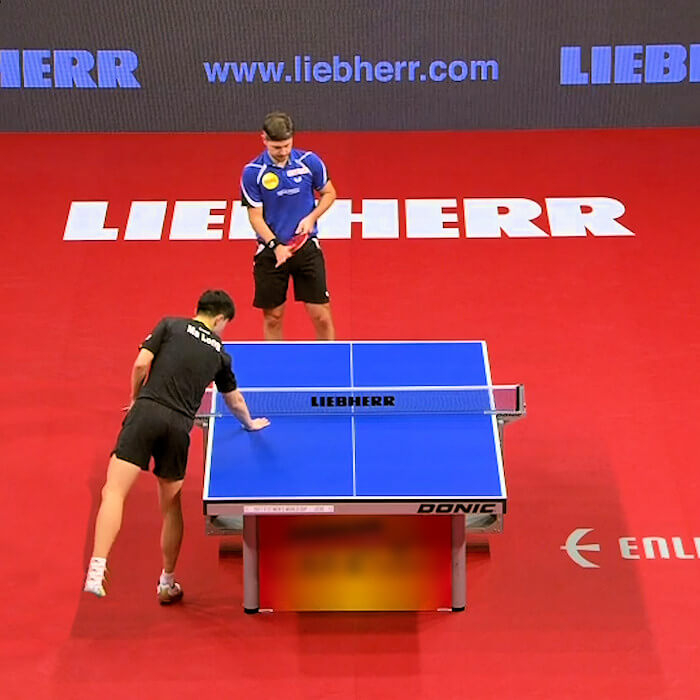 Player wipe the sweat / perspiration from their hands onto the table - urgh!
Player wipe the sweat / perspiration from their hands onto the table - urgh!
When the ball is not in play, there's no penalty for touching the table.
So you'll often see players wiping the sweat / perspiration from their hands, near the net. (This part of the table is the least used portion of the table during a rally).
They do this because you're only allowed to use a towel after every 6 points, so some players use the table at other times.
The ITTF recently said that they were going to try to discourage this, but they do not seem to be doing anything yet.
However, for many players it just becomes a habit or another ritual they perform during a match, and many players won't even realise that they're doing it so often, until you point it out to them.
Also, some players do it in order to slow the game down, as it takes a few moments to wipe your hand and then return to the end of the table ready to serve or receive.
The umpires should be stopping players doing it, but it's not against the rules yet.
^ Top of page ^
And what do the basic table tennis rules say about...
Touching the net
Rule 2.10 also states that...
Unless the rally is a let, a player shall score a point if an opponent, or anything an opponent wears or carries, touches the net assembly.
This means that if you touch the table tennis net or the net posts whilst the ball is still in play, you lose the point.
As with moving the table tennis table, this usually happens when you rush forward to play a shot and your forward momentum may cause you to touch the net.
Need your questions about the Rules and Regulations answered SIMPLY and CLEARLY?
Take a look at this fully up-to-date downloadable book. You'll find everything you need.
Get all the details here...

^ Top of page ^
| MORE PAGES ABOUT THE RULES OF TABLE TENNIS |
|---|
For more information about the rules of table tennis, take a look at my other articles which explain the Official
Laws of Table Tennis and the additional Regulations (for higher level play) in more detail...
The Laws of Table Tennis
Regulations (for higher level play)
General
Frequently Asked Questions
|
Click here for a large selection of
table tennis equipment at Megaspin *

Click here for a large selection of
table tennis equipment at Bribar *
^ Top of page ^
You Are Here: Home » Rules of Table Tennis » A Good Return
